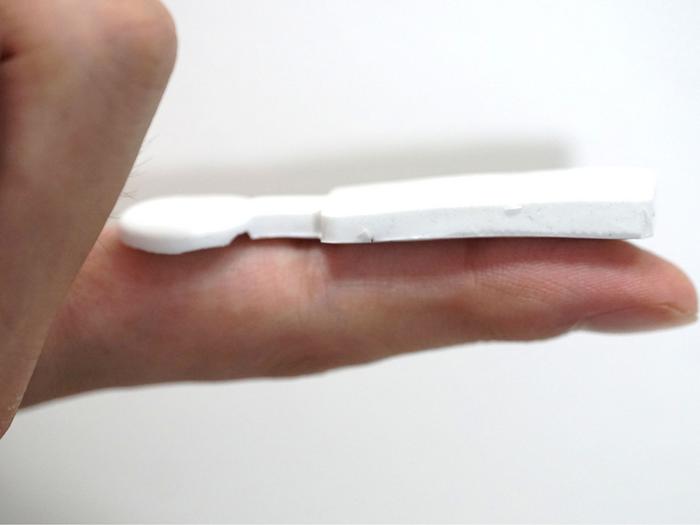
In an unprecedented stride toward advancing mental health diagnostics, scientists at Penn State have engineered a revolutionary stretchable and rechargeable wearable sticker capable of detecting genuine human emotions by meticulously measuring physiological signals such as skin temperature, heart rate, humidity, and blood oxygen levels. This innovation addresses a longstanding challenge in emotional recognition: the discrepancy between outward facial expressions and the actual emotional state beneath, offering a more profound and accurate assessment of psychological well-being.
Traditional methods of emotion detection rely heavily on analyzing facial expressions, which can often be misleading since individuals frequently mask their true feelings behind controlled and practiced expressions. The device developed by Penn State’s interdisciplinary team transcends this limitation by integrating multimodal sensors that decouple and independently monitor subtle physiological changes tied to emotional states. This approach promises to enrich the understanding of emotional health in ways previously unattainable by mere visual cues alone.
At the heart of this technology lies a meticulously designed hybrid electronic system composed of ultra-thin, flexible materials including biocompatible metals like platinum and gold. These metals are engineered into undulating wave-like patterns which maintain sensor sensitivity even when the sticker experiences significant mechanical deformation such as stretching or twisting. Such structural ingenuity ensures consistent and reliable data acquisition during natural human motions, critical for real-world applications.
Moreover, the researchers incorporated layers capable of modulating electrical current in response to temperature variations, alongside carbon atom-based hollow nanotubes that absorb ambient moisture, thereby providing precise readings of temperature and humidity changes on the skin’s surface. This nuanced capture of microenvironmental factors is essential since these parameters fluctuate with emotional arousal and stress.
To safeguard measurement fidelity, the device’s architecture includes physical segregations such as rigid underlayers beneath temperature and humidity sensors. These layers insulate sensitive components from the dynamic mechanical strain endured by facial expression sensors during movement. Additionally, waterproof membranes protect sensors from excessive humidity exposure, preventing data corruption and preserving sensor longevity.
Data transmission is conducted wirelessly, allowing real-time streaming of physiological metrics to mobile devices and cloud platforms. This connectivity not only facilitates remote monitoring by healthcare professionals but also emphasizes user privacy, as the device collects physiological signal patterns instead of identifiable personal information, thereby adhering to stringent data protection standards.
Complementing this hardware is an artificial intelligence (AI) framework trained to interpret the complex signals the device records. The AI model was developed using a pilot dataset wherein participants performed 100 repetitions of six fundamental facial expressions: happiness, surprise, fear, sadness, anger, and disgust. These datasets empowered the AI to discern nuanced associations between sensor outputs and distinct emotional expressions with remarkable accuracy.
Further validation involved exposing participants to emotion-eliciting video stimuli, with the sticker continuously recording physiological responses in real time. Impressively, the AI-driven recognition system achieved an 88.83% accuracy in identifying genuine emotional states, correlating physiological markers such as heightened skin temperature and elevated heart rate with emotional intensities linked to surprise and anger, respectively.
Beyond individual emotion detection, this technology promises to bridge cultural and social gaps often encountered in clinical mental health evaluations. By providing objective physiological data, clinicians can better understand emotional expressions that might otherwise be misinterpreted due to cultural stoicism or expressive variability, potentially facilitating earlier detection of conditions like anxiety or depression.
The potential applications of this versatile sensor extend well beyond emotion monitoring. Lead researcher Huanyu “Larry” Cheng envisions its integration into AI-powered diagnostic systems for chronic neurological and psychiatric disorders, non-verbal patient assessments, and even monitoring of physiological distress in opioid overdoses. There are also prospects for employing the device in tracking wound healing processes and athletic performance metrics, underscoring its broad biomedical utility.
Fundamentally, this development marks a paradigm shift in wearable technology, highlighting the convergence of materials science, biomedical engineering, and artificial intelligence to deliver tools that can decode the intricate language of human emotions. As mental health challenges become increasingly prevalent worldwide, such innovations hold promise for promoting proactive, personalized care and bridging access gaps through remote telemedicine capabilities.
Although currently in the research and development phase, this stretchable, multimodal electronic sticker represents a significant leap toward realistic, scalable solutions for emotion detection. Its unique blend of mechanical resilience, biosignal specificity, and AI interpretability could revolutionize how emotional well-being is monitored and managed both in clinical settings and everyday life.
The device’s pioneering attributes exemplify how thoughtful engineering can transform subjective experiences like emotions into quantifiable data, opening avenues for enhanced psychological insight and therapeutic interventions. As the field progresses, collaborations across disciplines will be paramount to refine the system, validate its effectiveness in diverse populations, and ensure its integration into healthcare infrastructures efficiently and ethically.
With backing from prominent institutions such as the U.S. National Institutes of Health and the National Science Foundation, this research underscores the critical role of sustained scientific investment in breakthroughs that intersect health, technology, and human experience. As this innovative patch inches closer to practical application, its potential to alleviate mental health stigmas and enable empathetic clinical care is profoundly exciting.
Subject of Research: People
Article Title: Stretchable, Rechargeable, Multimodal Hybrid Electronics for Decoupled Sensing toward Emotion Detection
News Publication Date: 24-Mar-2025
Web References:
Nano Letters Article
References:
DOI: 10.1021/acs.nanolett.4c06392
Image Credits:
Yangbo Yuan / Penn State
Keywords: Facial expressions
Tags: accurate emotional state assessmentadvanced sticker technologybiocompatible materials in wearablesemotional health diagnosticshybrid electronic systems in health techinnovative mental health solutionslimitations of facial expression analysismultimodal sensors for mental healthPenn State interdisciplinary researchphysiological signals and emotionsstretchable and rechargeable sensorswearable technology for emotion detection





